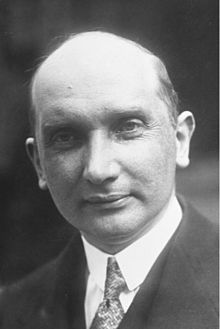August Zaleski
August Zaleski (born September 13, 1883 in Warsaw , † April 7, 1972 in London ) was a Polish diplomat and politician .
Life
A historian and economist by profession (he studied at the London School of Economics and Political Science ), Zaleski joined the Polish Foreign Ministry in 1918 and was appointed Polish envoy in Bern . From 1919 to 1926 he worked as a Polish diplomat in Greece and Italy . After Józef Pilsudski - May Coup of 12 May 1926 he was appointed the same year the Polish foreign minister and held this office until 1932 held, after which he was in the years from 1935 to 1939 Chairman of the Supervisory Board of the Polish Commercial Bank.
From October 1939 to July 1941 he was Foreign Minister of the Polish government in exile under Prime Minister Władysław Sikorski . He resigned from his post in protest against the Sikorski-Maiski Agreement , which sealed Polish-Soviet cooperation against the German Reich. From 1943 to 1945 he was head of the presidential office.
After the death of Władysław Raczkiewicz , he took over the office of President in exile in 1947 . His constitutionally permissible two terms of office of seven years each should expire in 1961 (he had even undertaken to resign in 1954 and leave the office to General Kazimierz Sosnkowski ). However, Zaleski refused to resign and remained president in exile until his death in 1972. This led to the fact that the majority of the Poles in exile (approx. 80%) headed by Edward Raczyński , General Władysław Anders and the former minister Tomasz Arciszewski (who led the so-called. Dreierrat formed), terminated his allegiance. Zaleski died in exile in London.
literature
- Andrzej Garlicki: Przewrót majowy . Warszawa: Czytelnik, 1979, ISBN 83-07-00069-6 , p. 340.
- Rafał Habielski: Polski Londyn , Wrocław 2000, s. 93.
Web links
- Literature by and about August Zaleski in the catalog of the German National Library
| personal data | |
|---|---|
| SURNAME | Zaleski, August |
| BRIEF DESCRIPTION | Polish diplomat and politician |
| DATE OF BIRTH | September 13, 1883 |
| PLACE OF BIRTH | Warsaw |
| DATE OF DEATH | April 7, 1972 |
| Place of death | London |
